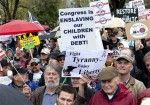Being Right: Brewing Uncertainty

Let me start off by saying that as a Republican who holds a myriad of views ranging from the party line to some ideals that are more commonly associated with the Democrats, I have been largely ignorant of the Tea Party phenomena. Mainly coming into focus during 2009, the Tea Party movement seems to be an outgrowth of libertarian conservatism. Disenfranchised with the current administration and what they perceive to be “big government,” the vocal members of the Tea Party are becoming hard to ignore any longer. Recent victories by self-identified tea partiers such as Christine O’Donnell and Joe Miller show that the Tea Party, while not a traditional third party in the common sense, is a growing force on the American political scene.
A growing force that I greet with growing skepticism. Due to general unhappiness with the current administration (apparently hope doesn’t magically fix the economy), Republicans are in a position to make gains in Congress. I fear, however, that the Tea Party movement might jeopardize those gains. Now usually I wouldn’t be skeptical about the election of conservative nominees – but Tea Party nominees will have to appeal to a broader base, something I
seriously doubt they can do.
The current administration and the Democratic party are sure to label Tea Party nominees as extremists, and seeing as how the Tea Party movement consists overwhelmingly of whites, and nearly half the members identify as Evangelical Christians, its a line people will probably buy. It’s true that the Tea Party is based on economic conservatism – the reduction of taxes and big government – but membership or identification with the movement does not make one an extremist.
Some high profile Democrats, like Bill Clinton, while concerned over the rise of the Tea Party, acknowledge that the movement’s grievances are founded in reality. In a poor economy, people get fed up with what they perceive to be an ineffective administration concerned with expanding the scope of government and adding to the already considerable tax burden of the American people.
Even so, as a fairly moderate Republican I am concerned over the electability of Tea Party candidates. The movement as a whole seems too much a like a knee jerk shift to the right at a time when moderation is needed. Add to the mix the endorsement of polarizing figures like Sarah Palin, whose name alone is enough to make many moderate and independent voters shudder and I think the Tea Party movement has a real chance of jeopardizing Republican chances at winning Congressional seats. By nominating unappealing nominees who are unable to bring in votes outside the Tea Party itself, the party as a whole could suffer.
The original Boston Tea Party was a message to the king – no doubt the members of the current Tea Party movement see themselves as sending the same message – that Americans are being crushed under the burden of taxation. It’s growing membership and recent nomination wins clearly show that the movement is striking a chord with at least some of the American people – whether or not those nominees can appeal to moderate Republicans and
Independents remains to be seen.








